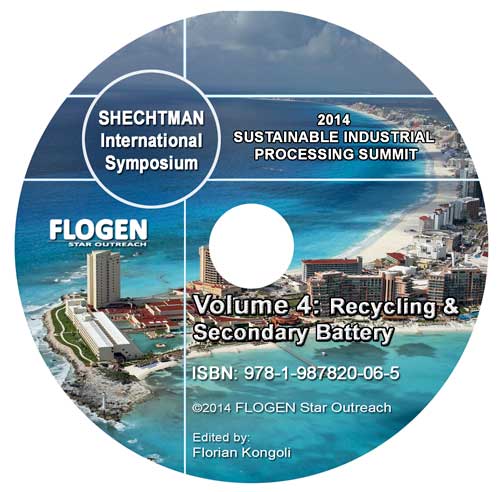2014-Sustainable Industrial Processing Summit
SIPS 2014 Volume 7: Energy Production, Environmental & Multiscale
| Editors: | Kongoli F |
| Publisher: | Flogen Star OUTREACH |
| Publication date: | 20 December 2014 |
| Pages: | 528 pages |
| ISBN: | 978-1-987820-09-6 |
| ISSN: | 2291-1227 (Metals and Materials Processing in a Clean Environment Series) |

CD shopping page
Production of spray-dried oxygen carrier particles for chemical looping combustion
Dirk Vangeneugden1;1VITO, Mol, Belgium;
Type of Paper: Keynote
Id Paper: 321
Topic: 15
Abstract:
Chemical looping combustion (CLC) is a promising technology for energy production with inherent capture of carbon dioxide at minimal energy penalty. In CLC, oxygen is transferred from an air reactor to a fuel reactor by means of a solid oxygen carrier. Direct contact between air and fuel is avoided resulting in an undiluted CO2 exhaust stream.
The technological concept was first developed in the 1980's to produce CO2. Recently, it was picked up as a high potential carbon capture and storage (CCS) technology. While initial focus was on storage projects, CO2 is more and more considered as a valuable chemical substance for enhanced oil/gas recovery projects as well as for the production of chemicals, plastics or building materials.
A critical aspect of the technology is the oxygen carrier performance which has a very strong impact on the economic viability. Parameters such as particle size, density, porosity, strength, attrition resistance, reactivity, environmental aspects and cost, define the performance of the oxygen carrier. Spray-drying is a suitable technique for the preparation of oxygen carrier particles with high sphericity, high attrition resistance, good free-flowing properties and homogeneity on micro-scale. The first generation oxygen carriers was Ni-based. However, due to cost of nickel and toxicity, a search for Ni-free oxygen carriers was conducted with similar or superior performance in CLC.
In this contribution, it is shown that spray-drying is a very versatile and scalable technique for the preparation of new and promising oxygen carriers with varying compositions. Different categories of materials have been produced and tested, such as perovskite type materials based on calcium-manganate, magnesium manganates, copper based materials and iron manganates.